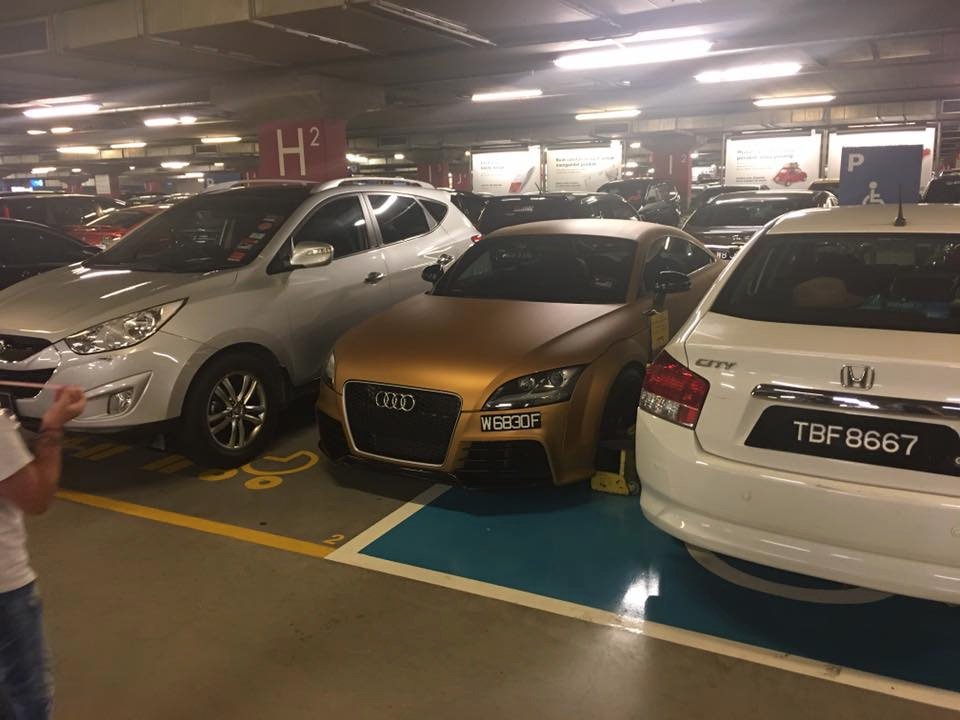

General,Traffic
What disabilities must you have to legally park in a OKU parking spot?
about 6 years ago K. SaraswathyIn Malaysia, like most countries, designated disabled spots are reserved for disabled drivers who have a valid disabled permit. We’re pretty sure everyone is more than familiar with the concept of disabled parking spots in Malaysia – larger than average parking spaces with a sign depicting a person sitting in a wheelchair painted on it.

Unfortunately, we may also be familiar with seeing cars that have no disabled stickers parked in them or, worse, someone with no visible disabilities getting in or out of the car.
While there have been civic-conscious Malaysians who have confronted the drivers of these cars, the usual response is either to be asked to mind their own business or to move away from the lot because they’ve been called out. There have also been some misunderstandings on what kind of OKU (yes, there are different categories) are allowed to park in these lots, as evidenced by a letter from a person with a mentally-disabled child being told that the lots were only for people with wheelchairs.
So… Who’s actually allowed to use disabled parking lots?

At the base of it, a driver requires 2 things to use a OKU parking spot:
- An OKU sticker (displayed on the vehicle)
- An OKU card (to be produced on request or displayed in the car)
However, it should be mentioned, that not all disabilities are physical, and there are separate categories for those mental disabilities as well. The OKU card is issued by the Social Welfare Department (JKM) upon a medical examination by a government medical officer who will then state the nature and type of the disability, as well as whether the disability is temporary or permanent. This also means that not everyone with an OKU card may be issued with an OKU sticker.
[READ MORE: What can the Kad OKU be used for, and how do you get one?]
The OKU sticker is only distributed by the Road Traffic Department (JPJ) upon completing the process and submitting documents required by the department. The conditions for application for the OKU stickers as laid down by JPJ are as stated below:
- Application may be submitted by the registered owner, beneficiary, or representative of the organization/association.
- Vehicle registered under the name of the disabled persons possessing OKU Card with the reference number that starts with ' PH ' (disabled persons with physical disability) or ' CA ' (old OKU Card reference number issued by the Social Welfare Department in Sarawak) or;
- The vehicle has been registered under code uses IT (vehicles for disabled people) or;
- A vehicle owned by organization/association of the disabled who have registered /received confirmation from the Department of Welfare.
However, some municipal councils also provide free OKU stickers, but the same requires must be met. It’s best to call or check your local council’s website to see if this is available for you.
What happens if you park on a disabled parking spot when you are not disabled?

For council-controlled parking spaces (basically public parking areas), disabled parking spaces can ONLY be used by a vehicle displaying an OKU sticker. The local authorities have the right to issue summonses to cars parked on the disabled parking spots without the said OKU stickers.
Section 48(2) of the Road Transport Act 1987 allows police officers or road transport officers or any appropriate authority to clamp the car that is parked in an obstructive manner or tow it away to another location. So, if you ever come across someone parking on a disabled parking spots without a OKU sticker, you may give the police/JPJ/the local authority a call and make a complaint about the obstruction.

A similar rule would generally apply for disabled parking lots located inside government and private buildings. However, this can be a little more discretionary as the building management or security guards may allow able-bodied drivers with disabled passengers to park in the disabled parking spaces. When you have no valid excuse for parking in a disabled spot, your vehicle may be clamped. In private parking situations, complaints can be made to the security personnel or the car park/building management.
Selfishness is not a disability

In order to enable persons with disability to live independently and participate fully in a wholesome and fulfilling life, Malaysia has showed its commitment by becoming one of the first signatories to the United Nations Convention on the Rights of Persons with Disabilities and Optional Protocol in 2007. Malaysia has since actively been attempting to make accessibility easier for persons with disabilities, primarily when it comes to toilets and car parks.
However, it’s also apparent that not all of us understand the importance of reserving those facilities to those with disabilities, especially parking spots. Coupled with accusations of lax enforcement, some members of the public may be tempted to take matters in their own hands by confronting drivers or recording/taking pictures of the offending vehicles.
While it’s an exercise on civic consciousness, it might also be a good idea to keep in mind that it’s an offence to provoke someone into a fight or damage their vehicle. If you’re putting up a picture or a video, it’s also a good idea to avoid adding negative descriptions that may defame the character of the driver – for example, you can just say “look at this car taking up an OKU spot” instead of “idiots like these got no education and beat their children”
[READ MORE: In Malaysia, shaming someone on social media could land you in jail]
After all, it’s never a good thing to see a good deed punished.